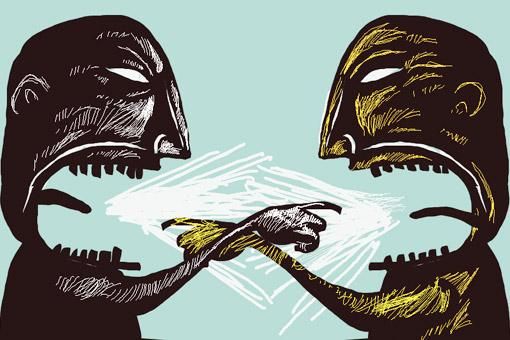Indian police were quick to blame Bangladesh-based militants for Guwahati blasts but they tend to ignore the increase of homegrown militancy in the country.
I was in Dhaka one day after the carnage in Guwahati. The Bangladesh press had front-paged the tragedy and had roundly criticised the perpetrators.
In a representative comment, the leading paper, The Daily Star, had said: "Such an act of cowardice snuffing out and maiming scores of innocent people in thickly crowded public places is utterly despicable. We have no words strong enough to condemn it."
But people were horrified over the impression that the blasts were the handiwork of Bangladesh. They attributed the remark to the "hostility" of Indians towards Bangladesh nationals.
They conceded that relations between the two countries had never been as low as they were today. Yet they did not imagine India would say against Bangladesh what it said about Pakistan till yesterday.
Chief Adviser of the caretaker government Fakhruddin Ahmad said in an interview that he would not rule out some Bangladesh nationals crossing into India. But to allege that there were training camps of terrorists or that the authorities connived in such activities was "very unfair to us and I deny all these charges categorically".
He said his government had been able to stop terrorism within its own country by taking appropriate measures. It was time that India realised that it had homegrown terrorists.
Howsoever reassuring the statements from Dhaka maybe, they have not removed the general impression in India that people from Bangladesh are behind the blasts.
The suspicion is primarily on the Bangladesh nationals living in the country, said to be about 3 million. Bangladesh is blamed because of the growing belief that it is a country where fundamentalism is spreading through mosques and madrassas.
I do not rule out some intelligence agencies in Dhaka conniving with the extremists. There is possibly a group which is inimical to India. But that has been there whatever the colour of the government.
Satisfactory reply
Yet we would delude ourselves if we were to believe that ULFA was returning to the path of peace. It is an outfit which is involved in every type of terrorism in the northeast.
ULFA chairman Paresh Baruah lives in Dhaka. Some other important ULFA leaders have also taken refuge in the city. The government has arrested only Anup Chatia, a top ULFA leader. I have found no satisfactory reply to this.
My queries led me to infer that the Guwahati incident is linked to the jihadis who have returned from Afghanistan after taking part in the "holy war" against American and European forces. But the motive of the jihadis is said to be money and Pakistan's ISI is alleged to be involved in their activities.
Many intellectuals, journalists and some others I met presented the same viewpoint. They even regret that the ISI is operating in a big way in the area. But they are so distant from India, as one editor puts it that joint action with New Delhi has never crossed their mind.
Yet like Pakistan, Bangladesh is resentful of India blaming outfits in their country without giving any evidence. Ahmad wanted "some proof."
I am not sure whether Bangladesh is going the fundamentalist way. During four days of my stay at Dhaka, I did not find any woman in burqa, nor any slogan poster or banner invoking Islam or Allah.
Music to which the extremists object to is the breath of life in Dhaka. Painting and fashion shows are plenty. The hanging of Bangla Bhai and his eight fundamentalist colleagues did not evoke any protest.
Even the Jamiat-e-Islamia has, for the first time, acknowledged the contribution of liberation struggle to the independence of Bangladesh.
The real danger to Bangladesh is the lack of alternative to Awami League headed by Shaikh Hasina and Bangladesh Nationalist Party (BNP) headed by Khalida Zia.
Street politics
The Awami League seems poised to sweep the polls scheduled to be held on December 18. At the same time, the common belief is that the BNP in the opposition will bring back street politics. If that happens, Bangladesh will be back to square one.
The good work done by the caretaker government will go awry and the fight between the two ladies will begin in right earnest.
I concede that the army did try to overhaul the system while remaining in the background. It may have wished a political alternative.
But the two ladies have been adamant on staying in politics, although both have been hurt by the exposures of corruption in high places.
My feeling is that all the countries in South Asia, including India, have to ponder over the limit to which political parties can go to articulate their demands. Rulers do not suffer, the common man does.
Kuldip Nayar is a former Indian High Commissioner to the UK and a former Rajya Sabha MP













